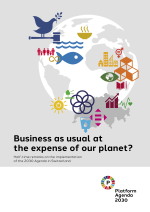Social Watch News
Published on Wed, 2022-08-03 18:55
The covid-19 pandemic has increased poverty and inequality in the country and has laid bare the weaknesses of the public health and social protection systems, educational systems as well as provision of livelihoods and employment to Filipinos. This has led to catastrophic consequences for workers and their families, the majority of whom are in the informal sector and many of whom are women. Yet, two years since the onset of the Covid-19 pandemic, there has been no fundamental change in the government’s developmental strategy to address these systemic weaknesses and prioritize the care programs and services that our people need. Emerging from what seems to be the worst period of the Covid-19 pandemic, the country is slowly returning to some semblance of ‘normalcy’ (or what is also referred to as ‘the new normal’). |
Published on Fri, 2022-07-29 17:01
This year's report of the Social Watch for the Czech Republic focuses on three areas: the economy, health and care and socio-economic transformation. The report responds to the ramifications of the Covid-19 pandemic, but it also reflects on issues related to the conflict in Ukraine, in particular the impact of rising energy prices and inflation. In the report, economist Ilona Švihlíková criticises the absence of national economic policy and chaotic conduct of the governments (there was a change in administrations after last year’s October elections) throughout the pandemic, as well as its unsystematic and antisocial tax policy. |
Published on Thu, 2022-07-28 17:53
Switzerland is not on course for a sustainable world. That’s the verdict from Platform Agenda 2030 in its new report “Business as usual at the expense of our planet? Half-time remarks on the implementation of the 2030 Agenda in Switzerland”. It is calling upon the Federal Council to show more leadership in the transformation needed to halve poverty, protect the climate and human rights, and hold the financial sector to account. |
Published on Wed, 2022-07-27 22:15
This GPW Round Up #2, Ensuring Social Protection for All, highlights the critical importance of universal social protection not only in recovering from the pandemic, but also its vital role to address pre-existing deep-seated inequalities between and within countries. It details gaps in social protection coverage and financing, especially in poor countries, and failures of the targeted, or means-tested approach, often promoted by IMF and World Bank. |
Published on Wed, 2022-07-20 15:05
In This Issue African countries express concerns on damaging effects of IFFs CSOs question many proposals in the S-G’s flagship report - Our Common Agenda - and its central concept of networked multilateralism. |
|
Published on Tue, 2022-07-19 18:04
|
Published on Sat, 2022-07-16 14:50
In the Latin American region, the economic recovery that started in 2021 after the big setback of 2020 did not stop the social crisis. “Unemployment rates and levels of poverty and extreme poverty are higher than before the COVID-19 pandemic”, according to ECLAC, the regional UN Economic Commission. Among those affected, women suffered “a historic setback”. In its recently published “Social Panorama of Latin America 2021”, ECLAC concludes that “one result of the pandemic has been an overburden of domestic and unpaid care and domestic work primarily assumed by women. |
Published on Fri, 2022-07-15 00:00
HLPF 2022 Online Side Event. The interlinked global crises from an Arab perspective: Systemic failures and its implications on social justice in the region. |
Published on Tue, 2022-07-05 00:00
HLPF 2022 Online Side Event. The interlinked global crises from an Arab perspective: Systemic failures and its implications on social justice in the region. |
Published on Thu, 2022-03-24 15:09
The new generation Doha Programme of Action for the Least Developed Countries for the Decade 2022-2031 (DPoA) was adopted by the first part of the Fifth United Nations Conference on the Least Developed Countries (LDC5) on 17 March, at the UN headquarters in New York. The adoption of the DPoA was overdue as the LDC5 Conference, scheduled to take place in January 2022 in Doha, Qatar, was postponed due to the ongoing COVID-19 pandemic. |
SUSCRIBE TO OUR NEWSLETTER









